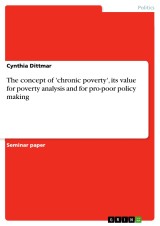Details

The concept of 'chronic poverty', its value for poverty analysis and for pro-poor policy making
1. Auflage
|
13,99 € |
|
| Verlag: | Grin Verlag |
| Format: | |
| Veröffentl.: | 20.07.2009 |
| ISBN/EAN: | 9783640378210 |
| Sprache: | englisch |
| Anzahl Seiten: | 11 |
Dieses eBook erhalten Sie ohne Kopierschutz.
Beschreibungen
Seminar paper from the year 2008 in the subject Politics - International Politics - Topic: Development Politics, grade: merit, University of Manchester (Institute for Development Policy and Management), course: Poverty and Livelihoods: Analysis, Policy and Action, language: English, abstract: Poverty reduction stands in the centre of the current development agenda of governments and aid agencies and is seen as an overarching aim of development intervention.
There is a danger that those suffering the severest forms of poverty will not be reached by the recent poverty agenda. It gets increasingly obvious that even in countries that perform well in terms of poverty reduction, there remains significant numbers of people in deprivation which is a sign that certain forms of poverty are not addressed by the current development agenda (Green and Hulme, 2005). The concept ‘chronic poverty’ is an attempt to understand and address those forms of poverty.
Chronically poor are defined as “people who remain poor for much of their life course, who may ‘pass on’ their poverty to their children, and who may die of easily prevent-able deaths because of the poverty they experience” (CPRC, 2004: 3) . Conservative estimates speak of 300 to 420 million chronically poor worldwide (ibid.).
The following three sections attempt to answer the question of whether the concept of ‘chronic poverty’ adds value to current poverty analysis and development policy. Sec-tion 2 introduces the concept ‘chronic poverty’ and section 3 gives an overview about current poverty analysis and its critiques, with a focus on current approaches and un-derstandings of poverty which influence the current poverty reduction agenda. Section 4 presents the analysis of whether the concept adds value to poverty analysis and the implications this may have for pro-poor policy making.
It will be argued that the concept of ‘chronic poverty’ has advantages on the conceptual level of poverty analysis and on the practical level of development policy and intervention. Those levels are highly interdependent: which measures are taken to fight poverty is dependant on how it is analysed and defined by academics, donors, societies and national decision makers. Therefore section four is divided into two parts: The first part will discuss the influences for conceptualising poverty and the second part will concentrate on practical implications for development policy and intervention.
[..]
There is a danger that those suffering the severest forms of poverty will not be reached by the recent poverty agenda. It gets increasingly obvious that even in countries that perform well in terms of poverty reduction, there remains significant numbers of people in deprivation which is a sign that certain forms of poverty are not addressed by the current development agenda (Green and Hulme, 2005). The concept ‘chronic poverty’ is an attempt to understand and address those forms of poverty.
Chronically poor are defined as “people who remain poor for much of their life course, who may ‘pass on’ their poverty to their children, and who may die of easily prevent-able deaths because of the poverty they experience” (CPRC, 2004: 3) . Conservative estimates speak of 300 to 420 million chronically poor worldwide (ibid.).
The following three sections attempt to answer the question of whether the concept of ‘chronic poverty’ adds value to current poverty analysis and development policy. Sec-tion 2 introduces the concept ‘chronic poverty’ and section 3 gives an overview about current poverty analysis and its critiques, with a focus on current approaches and un-derstandings of poverty which influence the current poverty reduction agenda. Section 4 presents the analysis of whether the concept adds value to poverty analysis and the implications this may have for pro-poor policy making.
It will be argued that the concept of ‘chronic poverty’ has advantages on the conceptual level of poverty analysis and on the practical level of development policy and intervention. Those levels are highly interdependent: which measures are taken to fight poverty is dependant on how it is analysed and defined by academics, donors, societies and national decision makers. Therefore section four is divided into two parts: The first part will discuss the influences for conceptualising poverty and the second part will concentrate on practical implications for development policy and intervention.
[..]
Diese Produkte könnten Sie auch interessieren:

Inclusión educativa de niños, niñas y adolescentes migrantes venezolanos, en Colombia

von: Douglas Jiménez

15,99 €
















